-
ORIGINAL ARTICLE11-22-2024
Transitions experienced by people living with limitations resulting from leprosy: a research-care study
Revista Brasileira de Enfermagem. 2024;77(5):e20230229
Abstract
ORIGINAL ARTICLETransitions experienced by people living with limitations resulting from leprosy: a research-care study
Revista Brasileira de Enfermagem. 2024;77(5):e20230229
DOI 10.1590/0034-7167-2023-0229
Views0See moreABSTRACT
Objective:
to understand the transitional processes that affect the adaptation of people who live with limitations resulting from leprosy.
Methods:
This is a qualitative study based on the precepts of Transition Theory, mediated by care-research, with 24 people with limitations resulting from leprosy in an ex-hospital colony in Piauí. Semi-structured interviews were carried out. The interviews were analyzed using Iramuteq software.
Results:
the researched-caregivers experienced the four types of transitions, including feelings of fear, worry, loneliness, hopelessness, guilt and a tendency to hide the diagnosis. Breakdowns and resignation were revealed, with spirituality, adaptation to the new life situation and acceptance as facilitating conditions for coping with the transitional process, with a consequent improvement in quality of life.
Final considerations:
the transitional processes had a positive significance, since they contributed to adaptation and the achievement of quality of life.
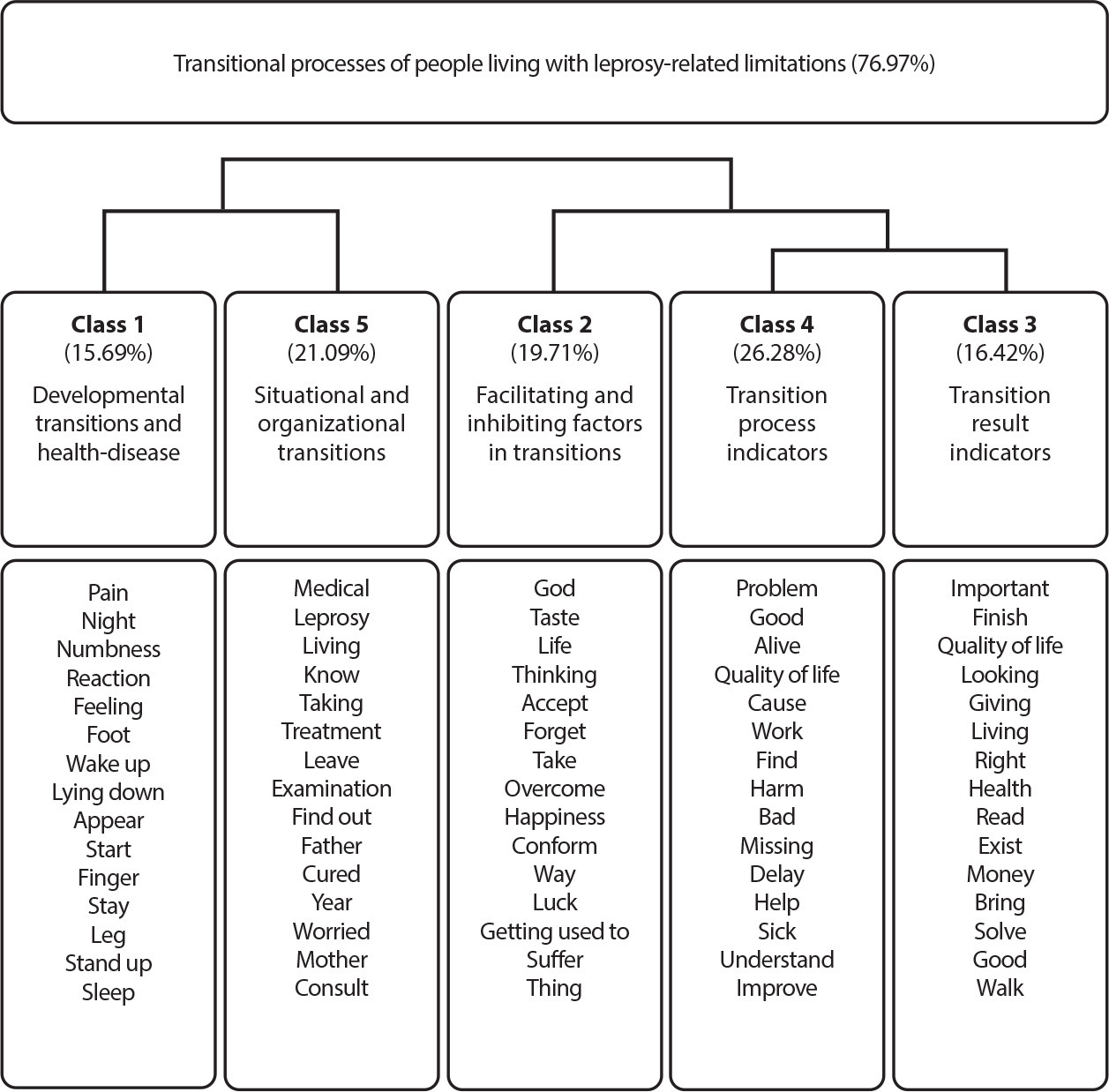
-
11-22-2024
Percepções de pessoas com deficiência física sobre acessibilidade e condições sociais: intervenções para enfermagem de reabilitação
Revista Brasileira de Enfermagem. 2024;77(5):e20240005
Abstract
Percepções de pessoas com deficiência física sobre acessibilidade e condições sociais: intervenções para enfermagem de reabilitação
Revista Brasileira de Enfermagem. 2024;77(5):e20240005
DOI 10.1590/0034-7167-2024-0005
Views0See moreRESUMEN
Objetivos:
analizar las experiencias de personas con discapacidad física adquirida en cuanto a accesibilidad y condiciones sociales; identificar intervenciones de rehabilitación dirigidas por enfermeras para la accesibilidad y condiciones sociales; determinar indicadores sensibles a la enfermería para mejorar la accesibilidad y condiciones sociales.
Métodos:
estudio cualitativo descriptivo-exploratorio utilizó entrevistas semiestructuradas con personas con discapacidad física adquirida mediante muestreo intencionado en bola de nieve para cumplir con todos los objetivos. El análisis de datos siguió los principios del análisis de contenido de Bardin. Los objetivos 2 y 3 se lograron mediante un enfoque teórico reflexivo.
Resultados:
los 27 participantes informaron desafíos de accesibilidad, que impactan las actividades de la vida diaria y las condiciones sociales. Esto influye en la enfermería de rehabilitación, dando lugar a tres campos de intervención: Evaluar la capacidad para realizar actividades diarias y los factores que influyen; Desarrollar e implementar capacitación para la realización de actividades diarias; Promover la movilidad, la accesibilidad y la participación social.
Consideraciones Finales:
a partir de las experiencias de los participantes, identificamos intervenciones de rehabilitación dirigidas por enfermeras para promover la accesibilidad y condiciones sociales.
-
ORIGINAL ARTICLE11-22-2024
Sociodemographic and occupational influences on health professionals’ quality of life
Revista Brasileira de Enfermagem. 2024;77(4):e20240010
Abstract
ORIGINAL ARTICLESociodemographic and occupational influences on health professionals’ quality of life
Revista Brasileira de Enfermagem. 2024;77(4):e20240010
DOI 10.1590/0034-7167-2024-0010
Views0See moreABSTRACT
Objective:
To analyze the sociodemographic and occupational influences on health professionals’ quality of life.
Method:
This descriptive-exploratory, cross-sectional, analytical, and quantitative study addressed 94 health workers, including nursing technicians, nurses, and physical therapists working in Intensive Care Units in a town in the extreme south of Brazil in 2023. The student’s t-test and Spearman correlation were used.
Results:
A significant positive correlation was found between being a woman and the psychological domain and between income and the social and environmental domain while working hours were inversely related to general QoL. Additionally, workload negatively impacted the physical, psychological, and general QOL, furniture negatively influenced the psychological domain, and equipment was negatively associated with the physical and psychological domain.
Conclusion:
The characteristics of the work environment interfere with several areas of quality of life.
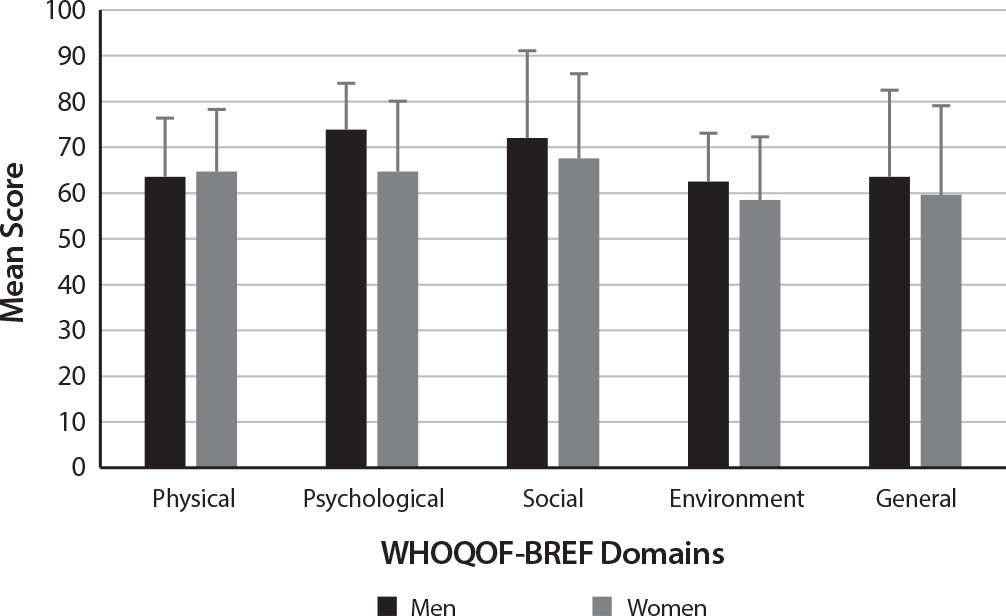
-
REVIEW11-22-2024
Concept analysis of youth: understanding the plurality of subjects
Revista Brasileira de Enfermagem. 2024;77(4):e20240002
Abstract
REVIEWConcept analysis of youth: understanding the plurality of subjects
Revista Brasileira de Enfermagem. 2024;77(4):e20240002
DOI 10.1590/0034-7167-2024-0002
Views0See moreABSTRACT
Objective:
To analyze the concept of “youth.”
Methods:
This is a concept analysis guided by the method proposed by Walker and Avant, operationalized through an integrative literature review. The search in scientific databases was carried out using the descriptors: youth; young; adolescence. To compose the literary corpus, 22 studies were selected.
Results:
Various factors were found in the antecedents that influence the separation of youth groups, contributing to the heterogenization of this population. The attributes include characteristics that comprise the formation of youth groups, especially the idea of shared experiences and social construction, as well as the consequences of the mentioned concept. After systematizing the variables, the analysis was conducted, highlighting the conceptions that influence youth.
Conclusion:
The study demonstrated the multifactorial complexity of the formulation of the concept of youth, highlighting various factors that contribute to this construction. For nursing, this conceptual field allows for an understanding of the population and effective engagement with this group.
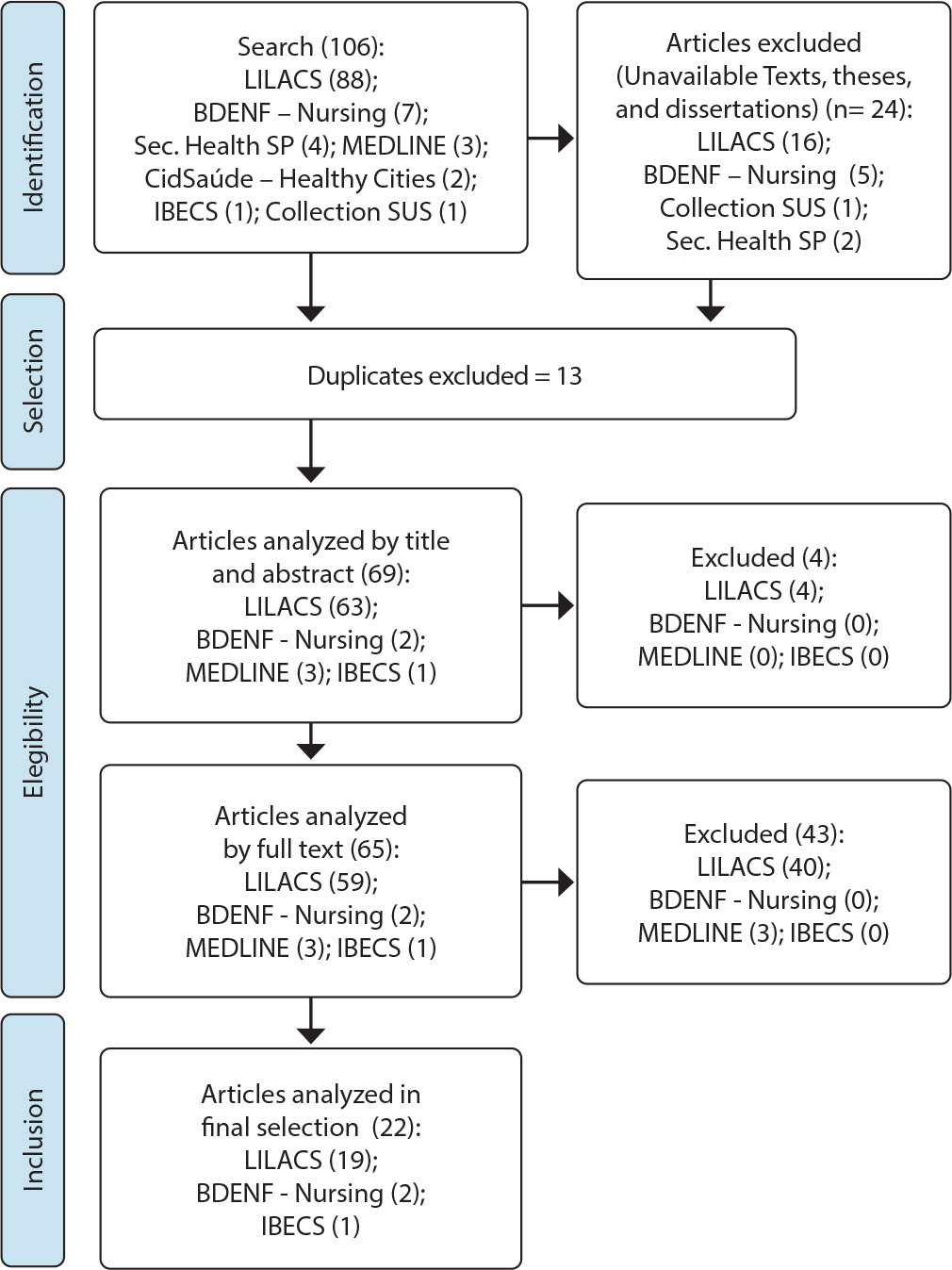
-
ORIGINAL ARTICLE11-22-2024
Temporal trends in neonatal mortality in Pernambuco
Revista Brasileira de Enfermagem. 2024;77(4):e20230451
Abstract
ORIGINAL ARTICLETemporal trends in neonatal mortality in Pernambuco
Revista Brasileira de Enfermagem. 2024;77(4):e20230451
DOI 10.1590/0034-7167-2023-0451
Views0See moreABSTRACT
Objective:
To verify the temporal trend of neonatal mortality in the health regions of Pernambuco between 2000 and 2020.
Method:
A time-series ecological study was conducted, analyzing the total neonatal mortality rate and its early and late components. For regression analysis, Joinpoint Regression was applied, trends were classified, and annual and average percentage changes were calculated for the period, with a significance level of 95%.
Results:
The average neonatal mortality rate in Pernambuco was 11.5 during the studied period. A decreasing trend in neonatal mortality rate was observed, especially in the early component. The region where the state capital is located showed the fastest decrease across all components.
Conclusion:
The temporal trend of neonatal mortality was decreasing; however, the rate of reduction was not uniform across the health regions of the state, and the implementation of the Mãe Coruja Pernambucana Program did not impact the trend in neonatal mortality.
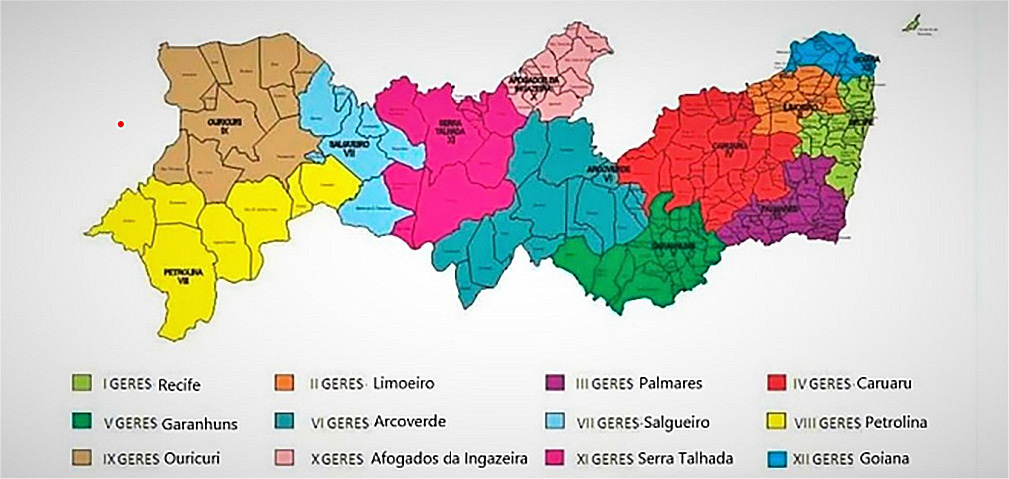
-
ORIGINAL ARTICLE11-22-2024
Evaluation of a video to promote HIV testing in sexual minorities
Revista Brasileira de Enfermagem. 2024;77(4):e20230320
Abstract
ORIGINAL ARTICLEEvaluation of a video to promote HIV testing in sexual minorities
Revista Brasileira de Enfermagem. 2024;77(4):e20230320
DOI 10.1590/0034-7167-2023-0320
Views0See moreABSTRACT
Objective:
To design and evaluate an educational video aimed at promoting HIV testing in gay men from the theoretical perspective of the Nola J. Pender Health Promotion Model.
Methods:
The design comprised five steps: 1.- Literature search; 2.- Formulation of the educational objective; 3.- Drafting of the script and location of the information in the theoretical components; 4.- Production; and 5.- Evaluation by experts and the target population.
Results:
The video “Living Without Fear” was produced, which presents the dilemma faced by gay men before taking a HIV test. The content validity index was 0.85, which indicated that the information was adequate and acceptable for promoting the rapid HIV test.
Final Considerations:
The results contribute to the scientific evidence aimed at promoting healthy behavior. In addition, the video was shown to be an acceptable educational tool.
-
ORIGINAL ARTICLE11-22-2024
Development and validity of a mobile application prototype for hospital shift handover
Revista Brasileira de Enfermagem. 2024;77(4):e20230173
Abstract
ORIGINAL ARTICLEDevelopment and validity of a mobile application prototype for hospital shift handover
Revista Brasileira de Enfermagem. 2024;77(4):e20230173
DOI 10.1590/0034-7167-2023-0173
Views0See moreABSTRACT
Objective:
To develop and validate a mobile application prototype for nursing shift handover in a hospital inpatient unit.
Methods:
A methodological study of technological production, carried out from April 2020 to January 2022, for mobile application construction and validity through the Design Thinking methodology. The study involved the stages of prototype development and validity by experts.
Results:
The application for mobile nursing shift handover obtained a usability score of 79 points and a content validity coefficient of 0.7.
Conclusions:
The instrument obtained an excellent assessment according to usability and agreement among experts. However, future studies are needed to implement this technology in order to assess effectiveness, time optimization and failures during communication.

-
ORIGINAL ARTICLE10-25-2024
Analysis of the vaccination situation against Mpox in people living with HIV/AIDS: an ecological study
Revista Brasileira de Enfermagem. 2024;77(5):e20230234
Abstract
ORIGINAL ARTICLEAnalysis of the vaccination situation against Mpox in people living with HIV/AIDS: an ecological study
Revista Brasileira de Enfermagem. 2024;77(5):e20230234
DOI 10.1590/0034-7167-2023-0234
Views0See moreABSTRACT
Objectives:
to analyze the vaccination situation against Mpox in people living with HIV/AIDS in Brazil.
Methods:
an ecological study on the vaccination status against Mpox in people living with HIV/AIDS (PLWHA) in Brazil. The data were collected in April 2023 through information from the Ministry of Health, using the “Microsoft app Power BI,” which is publicly accessible.
Results:
the data analysis revealed that in Brazil, 2,978 doses of the MVA-BN Jynneos Mpox vaccine were administered in PLWHA, resulting in a vaccination coverage of 18.3%, with the southern and southeastern regions showing the lowest and highest vaccination coverage, respectively. Gender-based evaluation showed a higher proportion of vaccinated males.
Conclusions:
we identified low vaccination coverage in all regions of Brazil, highlighting the need for intensified vaccination activities, especially for PLWHA.
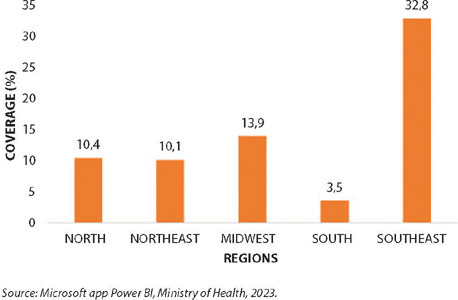
-
ORIGINAL ARTICLE06-17-2020
Implementation of improvement cycle in health records of mobile emergency prehospital care
Revista Brasileira de Enfermagem. 2020;73(4):e20190049
Abstract
ORIGINAL ARTICLEImplementation of improvement cycle in health records of mobile emergency prehospital care
Revista Brasileira de Enfermagem. 2020;73(4):e20190049
DOI 10.1590/0034-7167-2019-0049
Views0See moreABSTRACT
Objective:
to evaluate the effect of the implementation of a quality improvement cycle in the completion of occurrence forms of a Mobile Emergency Service.
Methods:
this is a time series, quantitative, quasi-experimental study without control group, with three quality assessments in which was used an improvement cycle for adequacy of health records in Mobile Emergency Service Patos.
Results:
in 100% of the seven criteria, there was improvement between evaluations. Noncompliance with criteria reduced from 95 cases in the first evaluation to eight cases in the third evaluation.
Conclusions:
the representation of joint results between the three evaluations highlighted progressive improvement in the compliance with each criterion.

-
ORIGINAL ARTICLE09-21-2020
Stigma perceived by overweight women
Revista Brasileira de Enfermagem. 2020;73:e20190321
Abstract
ORIGINAL ARTICLEStigma perceived by overweight women
Revista Brasileira de Enfermagem. 2020;73:e20190321
DOI 10.1590/0034-7167-2019-0321
Views0See moreABSTRACT
Objective:
to understand the experience of discrimination perceived by overweight women.
Methods:
a qualitative research conducted at an outpatient clinic in Salvador, Bahia, where eleven women were interviewed. The interviews were transcribed and submitted to thematic content analysis.
Results:
the analysis of the statements expressed three categories: Suffering discrimination in different social contexts: denounced disrespect, hostility, veiled and/or explicit exclusion, prejudice, injustice and insults lived in public transport, at work, in the family environment, in social events and commercial establishments; Experiencing negative feelings about discrimination: revealed inferiority, sadness, shame, fear, anger, frustration, low esteem and discouragement faced by women; Reacting to discrimination: expressed isolation of marital intimacy and social encounters, removal from work, concealment of body and feelings and even illness of women.
Final considerations:
the discrimination experienced in various settings has caused suffering, embarrassment, negative feelings, shame, isolation and loss in women’s lives.
-
ORIGINAL ARTICLE09-19-2022
The experience of trans or transvestite women in accessing public health services
Revista Brasileira de Enfermagem. 2022;75:e20210713
Abstract
ORIGINAL ARTICLEThe experience of trans or transvestite women in accessing public health services
Revista Brasileira de Enfermagem. 2022;75:e20210713
DOI 10.1590/0034-7167-2021-0713
Views0See moreABSTRACT
Objective:
to understand the meanings of being a trans or transvestite woman in the care provided by Unified Health System health professionals.
Methods:
qualitative research, guided by Heidegger’s phenomenology, with 10 trans or transvestitewomen residing and using the Unified Health System in a municipality in Minas Gerais. Fieldwork was carried out by interviews.
Results:
trans or transvestitewomen reproduce the social patterns constructed and accepted by the female, with the search for hormonization being common, and, when it is difficult to obtain a prescription, they resort to self-medication. Social name use and acceptance by health professionals promote recognition. Trans or transvestitewomen experience prejudice on a daily basis, not only by professionals, but also because of the assumption of diagnoses by other users.
Final considerations:
transphobia promotes withdrawal from health services, due to fear, shame, knowledge about professionals’ unpreparedness, triggering illness, social exclusion and violence.
-
ORIGINAL ARTICLE06-10-2022
Effects of the economic recession on suicide mortality in Brazil: interrupted time series analysis
Revista Brasileira de Enfermagem. 2022;75:e20210778
Abstract
ORIGINAL ARTICLEEffects of the economic recession on suicide mortality in Brazil: interrupted time series analysis
Revista Brasileira de Enfermagem. 2022;75:e20210778
DOI 10.1590/0034-7167-2021-0778
Views0See moreABSTRACT
Objectives:
to analyze trends in suicide rates in Brazil in the period before and after the start of the economic recession.
Methods:
interrupted time series research using national suicide data recorded in the period between 2012 and 2017 with socioeconomic subgroups analyses. Quasi-Poisson regression model was employed to analyze trends in seasonally adjusted data.
Results:
there was an abrupt increase in the risk of suicide after economic recession in the population with less education (12.5%; RR = 1.125; 95%CI: 1.027; 1.232) and in the South Region (17.7%; 1.044; 1.328). After an abrupt reduction, there was a progressive increase in risk for the black and brown population and for those with higher education. In most other population strata, there was a progressive increase in the risk of suicide.
Conclusions:
the Brazilian economic recession caused different effects on suicide rates, considering social strata, which requires health strategies and policies that are sensitive to the most vulnerable populations.
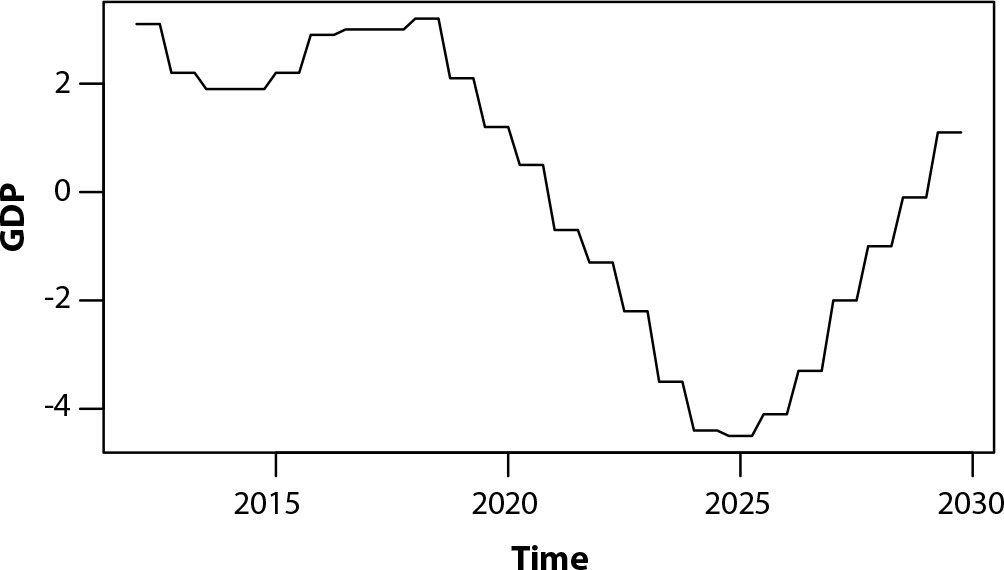
-
REVIEW05-21-2021
Evaluation strategies in active learning in higher education in health: integrative review
Revista Brasileira de Enfermagem. 2021;74(2):e20201055
Abstract
REVIEWEvaluation strategies in active learning in higher education in health: integrative review
Revista Brasileira de Enfermagem. 2021;74(2):e20201055
DOI 10.1590/0034-7167-2020-1055
Views0See moreABSTRACT
Objectives:
to analyze scientific evidence on evaluation strategies for active learning methods in health undergraduate programs.
Methods:
integrative literature review in the Medical Literature Analysis and Retrieval System Online, Latin American and Caribbean Literature in Health Sciences, Nursing Database, Scopus, Web of Science and Education Resources Information Center databases.
Results:
different evaluation strategies are used: Presentation of seminars, Self-evaluation, Evaluation of student performance in Tutotest-Lite tutoring, Peer Evaluation, Active Learning and Critical Thinking Self-evaluation Scale, Objective and Structured Clinical Exam, Portfolio, Progressive Disclosure Questions, Modified Dissertation Questions, Progression Test, Dissertation Test, Objective Test, Immediate Learning Checks, Clinical Case Resolution and Cumulative Test.
Final Considerations:
evaluation strategies in active learning are used in combination, aiming at the affective, cognitive and psychomotor development of the student. However, studies with greater power of scientific evidence would be needed.
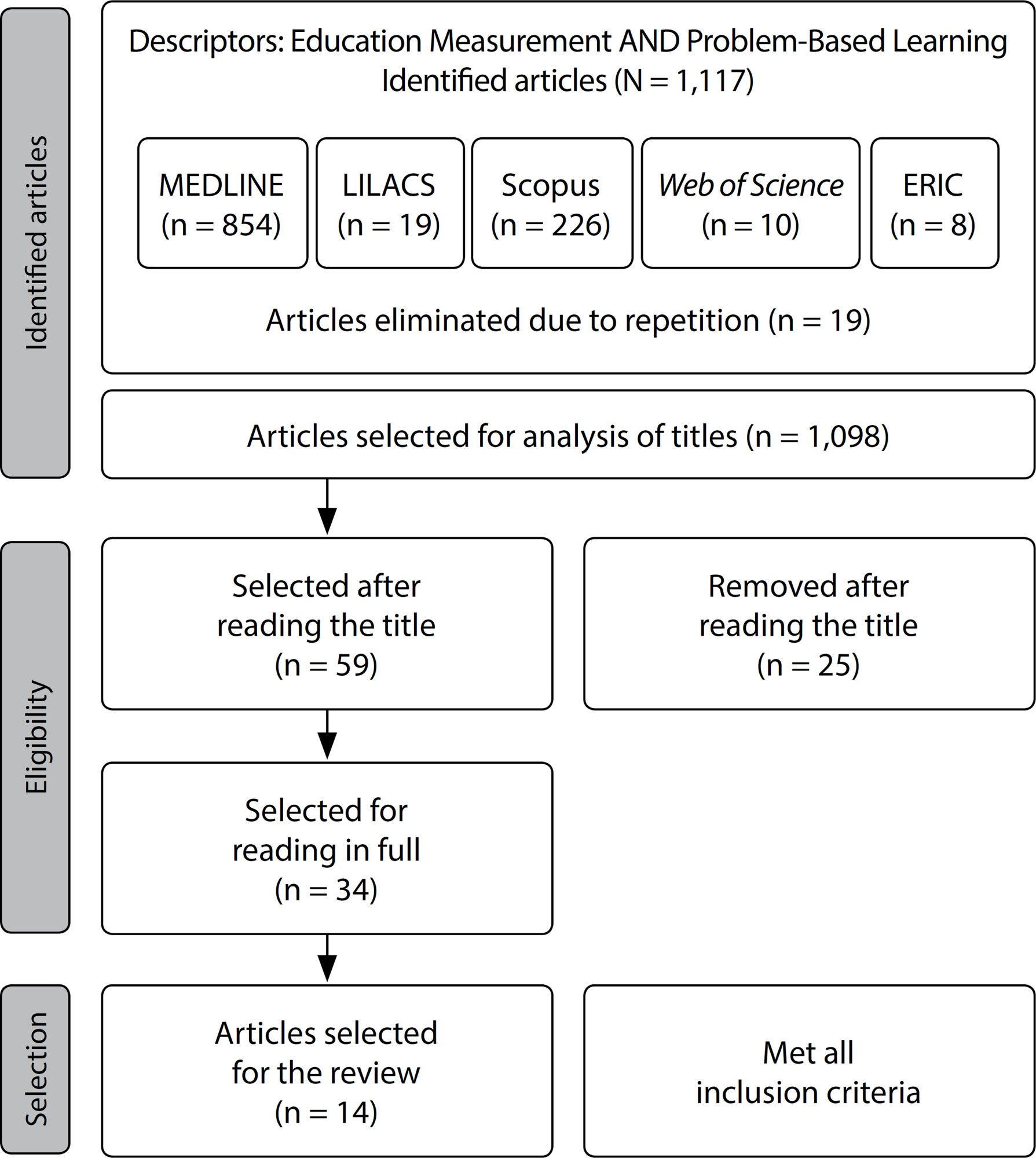
-
ORIGINAL ARTICLE12-05-2019
Participation in university activities for the elderly: Motivations of Brazilian and Spanish Seniors
Revista Brasileira de Enfermagem. 2019;72:104-110
Abstract
ORIGINAL ARTICLEParticipation in university activities for the elderly: Motivations of Brazilian and Spanish Seniors
Revista Brasileira de Enfermagem. 2019;72:104-110
DOI 10.1590/0034-7167-2018-0181
Views0See moreABSTRACT
Objective:
To understand the reasons that lead Brazilian and Spanish seniors to enroll in a university for the elderly.
Method:
A qualitative study that used Symbolic Interactionism as a theoretical reference and the Grounded Theory as a methodological reference. We interviewed 44 seniors enrolled in universities for the elderly from two countries (Brazil and Spain) between October 2014 and May 2016.
Results:
The motivations were related to the necessity of occupying the free time, even for improving health; to the opportunity of access to university learning bypassing formal education criteria; to the expansion of social relations, sought through the creation of new friendships, the desire to know other people’s life experiences, and the exchange of knowledge.
Final considerations:
Older people have sought in universities for the elderly a pleasurable way of learning and occupying the free time.
-
ORIGINAL ARTICLE08-10-2020
Knowledge, applicability and importance attributed by nursing undergraduates to communicative strategies
Revista Brasileira de Enfermagem. 2020;73(6):e20190411
Abstract
ORIGINAL ARTICLEKnowledge, applicability and importance attributed by nursing undergraduates to communicative strategies
Revista Brasileira de Enfermagem. 2020;73(6):e20190411
DOI 10.1590/0034-7167-2019-0411
Views0See moreABSTRACT
Objectives:
To evaluate the knowledge, applicability and importance that nursing students attribute to therapeutic communicative strategies.
Methods:
This is a quantitative study (survey) with nursing undergraduates from a public institution. The online questionnaire by the SurveyMonkey tool, comprising the informed consent form and six questions, had its relevance, clarity and operability assessed by experts.
Results:
Of the 104 graduates, 50 participated in the study; the most well-known and applied strategy was Therapeutic Communication, followed by Ask-Tell-Ask, NURSE and Tell Me More; the least were PACIENTE and SPIKES. Most use the strategies they know best; all were considered important by at least 82% of the students.
Conclusions:
The partial knowledge and application of these strategies by the students contributes to reflect on the complexity of their teaching-learning process.
-
ORIGINAL ARTICLE05-28-2021
The work of a Brazilian nursing team of collective health in the special indigenous health district
Revista Brasileira de Enfermagem. 2021;74(2):e20200116
Abstract
ORIGINAL ARTICLEThe work of a Brazilian nursing team of collective health in the special indigenous health district
Revista Brasileira de Enfermagem. 2021;74(2):e20200116
DOI 10.1590/0034-7167-2020-0116
Views0See moreABSTRACT
Objective:
To identify the potential and the limits of the actions of the nursing team in the Primary Health Care for the Health of the Indigenous.
Methods:
This is a quantitative study guided by the Theory of Practical Intervention of Nursing and Collective Health. 230 nursing professionals participated, responding to an instrument about the frequency of the actions carried out in assistance, management, teaching, and research.
Results:
168 nursing technicians and 62 nurses participated. As strengths, 80% participated in the assistance most of the time. Stand out: 90.3% and 71% of nurses carried out nursing consultations and house visits, respectively. As a limitation, the involvement in education and research is small. Only 2% of the interviewees carried out scientific researches, reflecting the need to broaden and qualify care and improve the use of traditional practices, overcoming the biomedical model.
Final considerations:
Nursing assistance is essential in the modification and monitoring of the epidemiological profile of indigenous populations, and its results allow for the planning of quality actions.

Search
Search in:
Nuvem de Tags
Enfermagem (930)Cuidados de Enfermagem (269)Atenção Primária à Saúde (239)Idoso (208)Educação em Enfermagem (151)Segurança do Paciente (150)Saúde Mental (145)Educação em Saúde (139)Estudos de Validação (131)Qualidade de Vida (104)Tecnologia Educacional (100)Promoção da Saúde (99)COVID-19 (91)Criança (91)Família (87)Enfermagem Pediátrica (86)Saúde do Trabalhador (86)Adolescente (85)Saúde Pública (82)Estudantes de Enfermagem (77)



